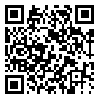Volume 23, Issue 91 (11-2024)
QJCR 2024, 23(91): 196-227 |
Back to browse issues page
Download citation:
BibTeX | RIS | EndNote | Medlars | ProCite | Reference Manager | RefWorks
Send citation to:



BibTeX | RIS | EndNote | Medlars | ProCite | Reference Manager | RefWorks
Send citation to:
Haghighat F, Madani Y, salehi K, Farasatkhah M, Pazargadi M. A Middle-Range Theory to Guide the Comprehensive Counselor Training Program in Iran: A Grounded Theory Study. QJCR 2024; 23 (91) : 7
URL: http://irancounseling.ir/journal/article-1-1966-en.html
URL: http://irancounseling.ir/journal/article-1-1966-en.html
(Corresponding Author), Ph.D of Counselor Education and Supervision, Assistant professor, Department of Counseling, Faculty of Psychology and Education, University of Tehran, Tehran, Iran. Yaser.Madani@ut.ac.ir
Abstract: (3916 Views)
Aim: The aim of this research is to present a theory to guide a comprehensive and quality counselor training program in Iran. Methods: By adopting a qualitative approach and grounded theory method, data were collected through semi-structured interviews, in the context of counselor training programs in Iran with purposeful sampling; open, central and selective coding was used to analyze the interviews. Results: The findings identified the core category of "personal growth and continuous professional development of the counselor and improvement of the quality of counseling". Other important categories and subcategories were "cognitive excellence" (strengthening critical thinking, strengthening creativity), "enhancing professional performance" (strengthening appropriate evaluation and effectiveness, continuous growth and development of communication and counseling skills) and "intern-oriented active learning" (educational and professional interactions, developmental assignments, continuous self-improvement). Conclusions: As a result of this research, a middle-range theory was formulated to facilitate the guidance of a comprehensive counselor training program, which helps the beneficiaries to ensure the quality and adequacy of this program, also improve the rate of graduates who are ready to enter the counseling profession field and reduce the waste of resources. Policy makers and administrators of various counselor training programs can use this theory as a reference to provide a rich and supportive educational and training environment to help the personal growth and continuous professional development of future counselors; This will ultimately lead to the improvement of the quality of education and counseling services.
Article number: 7
Keywords: counseling, counselor education, counselor training program, program guidance, grounded theory, quality improvement
Type of Study: Research |
Subject:
Career counseling
Received: 2023/09/14 | Accepted: 2024/11/8 | Published: 2024/12/19
Received: 2023/09/14 | Accepted: 2024/11/8 | Published: 2024/12/19
| Rights and permissions | |
 |
This work is licensed under a Creative Commons Attribution-NonCommercial 4.0 International License. |





